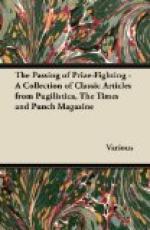Of course HIGLINSON should have changed his name, and should have married. But the idiotic notions about pluck prevented him from changing his name; and he would not marry a woman who accepted him from only mercenary motives. He was so unattractive that he did not think it possible a woman would marry him for any other reason. However, he could not always be superintending the manufacture of Blacking-cream; and it was obvious to him that he could publish no more verses. So he devoted himself to philanthropy in a quiet and unostentatious way. He attempted the reclamation of street-arabs. He worked among them. He spent vast sums on providing education, training, and decent pleasures for them. A man who wrote for The Scalpel found him out at last. Next day there was a pretty little paragraph in The Scalpel, showing Mr. HIGLINSON up, and suggesting that this was a clever attempt to get the London shoe-blacks to use HIGLINSON’s Blacking-cream. The Blacking-cream, by the way, had never been advertised in The Scalpel.
HIGLINSON was furious. He spent a little money in finding out who had written the paragraph. Then he walked up to the writer in a public street, with raised walking-stick. “Now, Sir,” he said, “you shall have the thrashing that you deserve.”
[Illustration]
But it happened that the writer was physically superior to HIGLINSON; so it was the writer who did the thrashing, and HIGLINSON who took it. Next day, The Scalpel amused itself with HIGLINSON to the extent of half a column. The notice was headed:—
“Mr. HIGLINSON advertises himself again.”
Other newspapers also amused themselves, and HIGLINSON became notorious. The Blacking-cream sold better than ever, and brought him enormous profits. But if he attempted to spend those profits on any object, good or bad, it was always insisted that he was simply doing it for advertisement. The public became interested in HIGLINSON; and untrue stories about his private life appeared freely in personal columns. He was rich enough now to have relinquished his business, but those idiotic notions about pluck prevented him from doing this. He meant to go through with it, and to make the public believe in him just as much as they believed in the Blacking-cream. He found about this time someone who did believe in him; he began to change his views about marriage; he was to some extent consoled.
He was passing over the bridge one night, and had just bought an evening paper. His own name caught his eye. It was the usual paragraph, not more hateful to him than others that had appeared, as far as he himself was concerned; but her name was in it as well, and he imagined to himself just how she would feel when she read it. He walked on a few paces, and then his pluck all vanished suddenly, as if it had been blown away into space, and it did not seem to be worth while to stop in such a world any longer.




